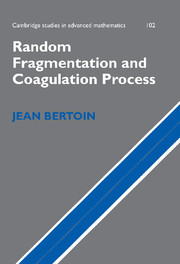1 - Self-similar fragmentation chains
Published online by Cambridge University Press: 07 December 2009
Summary
Informally, imagine an object that falls apart randomly as time passes. The state of the system at some given time consists in the sequence of the sizes of the pieces, which are often called fragments or particles. Suppose that the evolution is Markovian and obeys the following rules. First, different particles evolve independently of each other, that is the so-called branching property is fulfilled. Second, there is a parameter α ∈ ℝ, which will be referred to as the index of self-similarity, such that each fragment with size s is stable during an exponential time with parameter proportional to sα. In other words, a particle with size s > 0 has an exponential lifetime with mean cs–α, where c > 0 is some constant. At its death, this particle splits and there results a family of fragments, say with sizes (si, i ∈ ℕ), where the sequence of ratios (si/s, i ∈ ℕ) has the same distribution for all particles. The purpose of this chapter is to construct such self-similar fragmentation chains, to shed light on their genealogical structure, and to establish some of their fundamental properties.
Construction of fragmentation chains
In this section, we briefly present some basic elements on Markov chains and branching Markov chains in continuous time which are then used for the construction and the study of fragmentation chains.
Information
- Type
- Chapter
- Information
- Random Fragmentation and Coagulation Processes , pp. 6 - 65Publisher: Cambridge University PressPrint publication year: 2006
